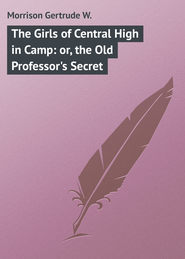По всем вопросам обращайтесь на: info@litportal.ru
(©) 2003-2024.
✖
The Girls of Central High on the Stage: or, The Play That Took The Prize
Настройки чтения
Размер шрифта
Высота строк
Поля
And Jose Manuel Green was brown;
While Ching Ling Blu was yellow,
As was known all over town!’
“I’d have made more of it,” added Bobby, “only Miss Gould didn’t seem to care for that kind of poetry. And I suppose if I tried my hand at a play that I would be unable to hit the popular taste,” and she sighed.
“I guess they won’t demand verse from us in this play,” giggled Jess. “And that is most atrocious, Bobby.”
“Think so?” returned her friend, her eyes twinkling. “And you’ll do a whole lot better when it comes to writing your own play, I s’pose?”
“It won’t be in verse – blank, or otherwise,” admitted Jess.
“You really are going to try for it?”
“Why, Bobby, I’d love to win that two hundred dollars. I don’t suppose I can. All the girls will try, I expect, and Laura, or Nell Agnew, will get it. But I want that two hundred dollars worse than I ever wanted anything in my life!”
She spoke so earnestly that Bobby was impressed. The latter glanced at her sidewise and a shrewd little smile hovered about her lips for a moment, which Jess did not observe.
“Where are you bound for, Jess?” she asked abruptly.
“Marketing.”
“You trade at Heuffler’s market, don’t you? That’s right around the corner from father’s store. Why don’t you ever patronize our place for groceries. I’m drumming up trade,” said Bobby, grinning.
“I guess our trade wouldn’t amount to much,” said Jess, flushing a little.
“‘Every little bit added to what you’ve got makes just a little bit more,’” quoted Bobby. “And let me tell you, Mr. Thomas Hargrew keeps first-class goods and only asks a fair profit.”
Jess laughed; but she caught at the straw held out to her, too. She knew it would be useless to go to Mr. Closewick’s, where they usually traded. Was it honest to try and obtain credit at another grocery?
“I am afraid your father wouldn’t welcome me as a customer,” said Jess, gravely. “Ours isn’t always a cash trade. Mother’s money comes so very irregular that we have to run a bill at the grocery and the market and other places.”
“Come on and give us a sample order,” urged Bobby. “Father will be glad to get another book account. Now, if you were running a store I’d patronize it! We Central High girls ought to work together – just like a lodge. Come on.”
She fairly dragged Jess by the hand into the store on Market Street, over the door of which Mr. Hargrew’s name was displayed. The clerks were busy at the moment, but Mr. Hargrew was at his desk in the corner. Bobby ran to him and whispered quickly:
“Here she is, Father. You remember what that Mrs. Brown said last night about old Closewick refusing her credit after her mother had traded there so long. And I am sure Jess is in trouble and needs help. Do wait on her, Father.”
“If you say so, Bob,” returned the big man, smiling down upon the girl who, he often said, “was as good as any boy.” “You’ll have to come into this store and share the business when you get older; and you might as well learn to judge customers now. And, if they need help – ”
He came out to Jess Morse immediately, smiling and bowing like the suave storekeeper he was.
“Glad to see you, Miss, What can we do for you this morning?”
“Why – why,” stammered Jess, “Bobby urged me to come in; but, really, Mr. Hargrew, it seems like asking a big favor of you, for we have never traded here much.”
“We are always glad to make a new connection,” said the storekeeper,
“But mother – we are obliged to ask for credit – ”
“And that is what I have to do very frequently myself,” interposed Mr. Hargrew, still smiling. “What is it you wish, Miss Morse? Your credit is good here, I assure you. You have brought the very best of references – my daughter’s. Now, what is the first article?”
Jess could have cried with relief! Somehow she felt that Bobby and her father must know of her need, yet not a word or sign from either betrayed that fact. And one would scarcely suspect harum-scarum Bobby Hargrew of engineering such a delicate bit of business.
Nevertheless, Jess was vastly encouraged by this incident. She went into the meat shop and purchased a small piece of lamb for over Sunday and Mr. Heuffler did not ask her for his bill. She hoped that “something would turn up” and watched the mails very eagerly, hoping that a fugitive check might come. But the postman never came near the little cottage at the elbow in Whiffle Street, all that day.
CHAPTER VIII – THE RACE IS ON
There was a rustle of expectancy – upon the girls’ side, at least – at Assembly on Monday morning. Rumors of the prize offered for the best play written by a girl of Central High had aroused great interest and the school eagerly awaited Mr. Sharp’s brief remarks regarding it.
“It is not our wish,” said the principal, in the course of his speech, “to restrict the contestants in their choice of subjects, or in methods of treatment. The play may be pure comedy, comedy-drama, tragedy – even farce – or melodrama. Miss Gould will confine her lectures this week in English to the discussion of plays and play-making. Candidates for fame – and for Mrs. Kerrick’s very handsome prize – may learn much if they will faithfully attend Miss Gould’s classes. And, of course, it is understood that there must be no neglect of the regular school work by those striving for the laurel of the playwright.
“I doubt if we have any budding female Shakespeares among us, yet I realize that the youthful mind naturally slants towards tragedy and the redundant phrases of the Greek and Latin masters, as read in their translation; but let me advise all you young ladies who wish to compete for the prize, to select a simple subject and treat it simply.
“Have your play display human nature as you know it, and realism without morbidness.”
The girls of Central High who had heretofore excelled in composition naturally were looked upon as favorites in this race for dramatic honors. Among the Juniors, Laura Belding and Nellie Agnew always received high marks for such work. They possessed the knack of composition and were what Bobby Hargrew called “fluid writers.”
“If it was a jingle or limerick, I’d stand a chance,” sighed Bobby to herself. “But think of the sustained effort of writing a whole play! Gee! two hours and a half long. It would break my heart to sit still long enough to do it.”
Jess Morse had never tried to more than pass in English composition. For the very reason, perhaps, that she had seen the practical side of such a career at home, she had not, like so many girls of her age, contemplated seriously literary employment for herself.
Lily Pendleton was known to have once essayed an erotic novel, and had read a few chapters to some of her closer friends. Bobby said it should have been written on yellow paper with an asbestos pad under it to save scorching Miss Pendleton’s desk. Of course, Lily would attempt a play in the most romantic style.
The boys began to hatch practical jokes anent the play-writing before the week was out; and one afternoon Chet Belding appeared in a group of his sister’s friends, and with serious face declared he had with him the outline and introductory scene of Laura’s play, its caption being:
“The Poisoned Bathing-Suit; or, The Summer Boarder’s Revenge.”
Some of the girls – and not alone the Juniors like Laura, Nellie and Jess – were very serious about this matter of the play. Mrs. Kerrick’s prize spurred every girl who had the least ability in that direction to begin writing a dramatic piece. Some, of course, did not get far; but the main topic of discussion out of school hours among the girls of Central High was the play and the prize.
Jess talked it over with her mother, and Mrs. Morse grew highly excited.
“Why, Josephine, dear, if you could win that prize it would be splendid! Then you could have a new party dress – and a really nice one – and the furs I have been hoping to buy you for two seasons. Dear, dear! what a lot of things you really could get for that sum.”
“I guess it would help us out a whole lot,” admitted the girl “We need so many things – ”
“Why, I shouldn’t allow you to use a cent of it for the household – or for me,” cried her mother. “No, indeed.”
“I haven’t won it yet,” sighed Jess. “But I guess if I did win it you’d have to take a part of it, Mother.”
“Nonsense, child!” cried Mrs. Morse. “We’ll have some checks in shortly. And we sha’n’t starve meanwhile. Now, let us look over this plot you have evolved and perhaps I can suggest some helpful points – and show you how to write brisk dialogue. That is something the editors always praise me for – although I have never dared try a play myself. It is so hard to get a hearing before a really responsible manager.”
Outside help for the girls was not debarred by the terms of the contest, so long as the main thread of plot in each play was original with the author, and she actually did the work. Jess listened to the practical suggestions of her mother in relation to her play; but all the time she had upon her mind, too, the domestic difficulties that seemed to have culminated just now in a single great billow of trouble.
No money had come in. She had been obliged to go once more to Mr. Hargrew for groceries, and to the meat store and to Mr. Vandergriff’s. Her mother could talk in her cheerful manner about what she could do with the two hundred dollar prize if she earned it. But Jess was very sure that she would not spend it for personal adornment – although no girl at Central High loved to be dressed in the mode more than Jess Morse.
“If such a darling thing should happen as my winning the prize, I’d put it all in the bank for a nest-egg,” she thought. “Then, when checks do not come in, we would not have to ask for credit. We’d pay up all debts and start square with the world. And then – and then I’d be perfectly happy!”
The first of the month arrived, and with it Mr. Chumley. Mrs. Morse was busy at her desk and said:
While Ching Ling Blu was yellow,
As was known all over town!’
“I’d have made more of it,” added Bobby, “only Miss Gould didn’t seem to care for that kind of poetry. And I suppose if I tried my hand at a play that I would be unable to hit the popular taste,” and she sighed.
“I guess they won’t demand verse from us in this play,” giggled Jess. “And that is most atrocious, Bobby.”
“Think so?” returned her friend, her eyes twinkling. “And you’ll do a whole lot better when it comes to writing your own play, I s’pose?”
“It won’t be in verse – blank, or otherwise,” admitted Jess.
“You really are going to try for it?”
“Why, Bobby, I’d love to win that two hundred dollars. I don’t suppose I can. All the girls will try, I expect, and Laura, or Nell Agnew, will get it. But I want that two hundred dollars worse than I ever wanted anything in my life!”
She spoke so earnestly that Bobby was impressed. The latter glanced at her sidewise and a shrewd little smile hovered about her lips for a moment, which Jess did not observe.
“Where are you bound for, Jess?” she asked abruptly.
“Marketing.”
“You trade at Heuffler’s market, don’t you? That’s right around the corner from father’s store. Why don’t you ever patronize our place for groceries. I’m drumming up trade,” said Bobby, grinning.
“I guess our trade wouldn’t amount to much,” said Jess, flushing a little.
“‘Every little bit added to what you’ve got makes just a little bit more,’” quoted Bobby. “And let me tell you, Mr. Thomas Hargrew keeps first-class goods and only asks a fair profit.”
Jess laughed; but she caught at the straw held out to her, too. She knew it would be useless to go to Mr. Closewick’s, where they usually traded. Was it honest to try and obtain credit at another grocery?
“I am afraid your father wouldn’t welcome me as a customer,” said Jess, gravely. “Ours isn’t always a cash trade. Mother’s money comes so very irregular that we have to run a bill at the grocery and the market and other places.”
“Come on and give us a sample order,” urged Bobby. “Father will be glad to get another book account. Now, if you were running a store I’d patronize it! We Central High girls ought to work together – just like a lodge. Come on.”
She fairly dragged Jess by the hand into the store on Market Street, over the door of which Mr. Hargrew’s name was displayed. The clerks were busy at the moment, but Mr. Hargrew was at his desk in the corner. Bobby ran to him and whispered quickly:
“Here she is, Father. You remember what that Mrs. Brown said last night about old Closewick refusing her credit after her mother had traded there so long. And I am sure Jess is in trouble and needs help. Do wait on her, Father.”
“If you say so, Bob,” returned the big man, smiling down upon the girl who, he often said, “was as good as any boy.” “You’ll have to come into this store and share the business when you get older; and you might as well learn to judge customers now. And, if they need help – ”
He came out to Jess Morse immediately, smiling and bowing like the suave storekeeper he was.
“Glad to see you, Miss, What can we do for you this morning?”
“Why – why,” stammered Jess, “Bobby urged me to come in; but, really, Mr. Hargrew, it seems like asking a big favor of you, for we have never traded here much.”
“We are always glad to make a new connection,” said the storekeeper,
“But mother – we are obliged to ask for credit – ”
“And that is what I have to do very frequently myself,” interposed Mr. Hargrew, still smiling. “What is it you wish, Miss Morse? Your credit is good here, I assure you. You have brought the very best of references – my daughter’s. Now, what is the first article?”
Jess could have cried with relief! Somehow she felt that Bobby and her father must know of her need, yet not a word or sign from either betrayed that fact. And one would scarcely suspect harum-scarum Bobby Hargrew of engineering such a delicate bit of business.
Nevertheless, Jess was vastly encouraged by this incident. She went into the meat shop and purchased a small piece of lamb for over Sunday and Mr. Heuffler did not ask her for his bill. She hoped that “something would turn up” and watched the mails very eagerly, hoping that a fugitive check might come. But the postman never came near the little cottage at the elbow in Whiffle Street, all that day.
CHAPTER VIII – THE RACE IS ON
There was a rustle of expectancy – upon the girls’ side, at least – at Assembly on Monday morning. Rumors of the prize offered for the best play written by a girl of Central High had aroused great interest and the school eagerly awaited Mr. Sharp’s brief remarks regarding it.
“It is not our wish,” said the principal, in the course of his speech, “to restrict the contestants in their choice of subjects, or in methods of treatment. The play may be pure comedy, comedy-drama, tragedy – even farce – or melodrama. Miss Gould will confine her lectures this week in English to the discussion of plays and play-making. Candidates for fame – and for Mrs. Kerrick’s very handsome prize – may learn much if they will faithfully attend Miss Gould’s classes. And, of course, it is understood that there must be no neglect of the regular school work by those striving for the laurel of the playwright.
“I doubt if we have any budding female Shakespeares among us, yet I realize that the youthful mind naturally slants towards tragedy and the redundant phrases of the Greek and Latin masters, as read in their translation; but let me advise all you young ladies who wish to compete for the prize, to select a simple subject and treat it simply.
“Have your play display human nature as you know it, and realism without morbidness.”
The girls of Central High who had heretofore excelled in composition naturally were looked upon as favorites in this race for dramatic honors. Among the Juniors, Laura Belding and Nellie Agnew always received high marks for such work. They possessed the knack of composition and were what Bobby Hargrew called “fluid writers.”
“If it was a jingle or limerick, I’d stand a chance,” sighed Bobby to herself. “But think of the sustained effort of writing a whole play! Gee! two hours and a half long. It would break my heart to sit still long enough to do it.”
Jess Morse had never tried to more than pass in English composition. For the very reason, perhaps, that she had seen the practical side of such a career at home, she had not, like so many girls of her age, contemplated seriously literary employment for herself.
Lily Pendleton was known to have once essayed an erotic novel, and had read a few chapters to some of her closer friends. Bobby said it should have been written on yellow paper with an asbestos pad under it to save scorching Miss Pendleton’s desk. Of course, Lily would attempt a play in the most romantic style.
The boys began to hatch practical jokes anent the play-writing before the week was out; and one afternoon Chet Belding appeared in a group of his sister’s friends, and with serious face declared he had with him the outline and introductory scene of Laura’s play, its caption being:
“The Poisoned Bathing-Suit; or, The Summer Boarder’s Revenge.”
Some of the girls – and not alone the Juniors like Laura, Nellie and Jess – were very serious about this matter of the play. Mrs. Kerrick’s prize spurred every girl who had the least ability in that direction to begin writing a dramatic piece. Some, of course, did not get far; but the main topic of discussion out of school hours among the girls of Central High was the play and the prize.
Jess talked it over with her mother, and Mrs. Morse grew highly excited.
“Why, Josephine, dear, if you could win that prize it would be splendid! Then you could have a new party dress – and a really nice one – and the furs I have been hoping to buy you for two seasons. Dear, dear! what a lot of things you really could get for that sum.”
“I guess it would help us out a whole lot,” admitted the girl “We need so many things – ”
“Why, I shouldn’t allow you to use a cent of it for the household – or for me,” cried her mother. “No, indeed.”
“I haven’t won it yet,” sighed Jess. “But I guess if I did win it you’d have to take a part of it, Mother.”
“Nonsense, child!” cried Mrs. Morse. “We’ll have some checks in shortly. And we sha’n’t starve meanwhile. Now, let us look over this plot you have evolved and perhaps I can suggest some helpful points – and show you how to write brisk dialogue. That is something the editors always praise me for – although I have never dared try a play myself. It is so hard to get a hearing before a really responsible manager.”
Outside help for the girls was not debarred by the terms of the contest, so long as the main thread of plot in each play was original with the author, and she actually did the work. Jess listened to the practical suggestions of her mother in relation to her play; but all the time she had upon her mind, too, the domestic difficulties that seemed to have culminated just now in a single great billow of trouble.
No money had come in. She had been obliged to go once more to Mr. Hargrew for groceries, and to the meat store and to Mr. Vandergriff’s. Her mother could talk in her cheerful manner about what she could do with the two hundred dollar prize if she earned it. But Jess was very sure that she would not spend it for personal adornment – although no girl at Central High loved to be dressed in the mode more than Jess Morse.
“If such a darling thing should happen as my winning the prize, I’d put it all in the bank for a nest-egg,” she thought. “Then, when checks do not come in, we would not have to ask for credit. We’d pay up all debts and start square with the world. And then – and then I’d be perfectly happy!”
The first of the month arrived, and with it Mr. Chumley. Mrs. Morse was busy at her desk and said:










